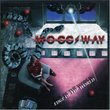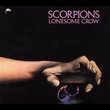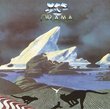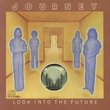| All Artists: UFO Title: Flying: The Early Years 1970-1973 Members Wishing: 4 Total Copies: 0 Label: Castle Us Release Date: 2/15/2005 Genres: Pop, Rock, Classic Rock, Metal Styles: Album-Oriented Rock (AOR), Arena Rock, British Metal, Hard Rock Number of Discs: 2 SwapaCD Credits: 2 UPC: 021823616124 |
Search - UFO :: Flying: The Early Years 1970-1973
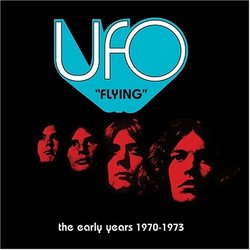 | UFO Flying: The Early Years 1970-1973 Genres: Pop, Rock, Classic Rock, Metal
|
Larger Image |
CD DetailsSimilar CDs
|
CD ReviewsCloser to late 60s garage rock-- than 70s arena rock Shelby Lambert | Bethany, Oklahoma USA | 03/03/2007 (5 out of 5 stars) "This is basically UFO's first three albums and one 7-inch single all in one compilation. Listening to this two-disc set as a whole (and I must tell you, there is not a bad song on this either one of the two discs!) I can sort-of see why UFO was signed at first to Tamla/Motown in America (as you'll find out in the liner notes). Of all the English bands of this era, this one in the beginning sounded more like Detroit garage rock with a London accent. The music fits somewhere between VERY early, pre-'71 Alice Cooper, The Amboy Dukes, and The Frost. Typical of 60s Detroit rock, UFO's music early on was largely bass-driven and groove-oriented, accentuated by a nice, classy touch on the drums by Andy Parker, and a man who really knows his way around the effects pedals--guitarist Mick Bolton. Certainly the best musician in the band early on was the bass player--Pete Way. His sound was powerful, but not overbearing--more like Alice Cooper's Dennis Dunnaway than Geezer Butler. Guitarist Mick Bolton's style was very much like Glenn Buxton and Michael Bruce from the early Alice Cooper band--not the best guitarist they could have had, but was very melodic and a great master of effects--especially wah-wah, echo, and phasing techniques--which he would bring more to the forefront on the "Flying" album (tracks 11-13 on disc one, and the first two tracks of disc two). I must say, for a guy that wasn't a brilliant soloist, Bolton put forth one of the most beautifully-melodic guitar solos I have ever heard on "Treacle People", especially his final solo toward the end when he makes gorgeous use of the "phaser". But Phil Mogg has to be one of my favorite singers in all of rock. Not a screamer or a shouter, but more of a "crooner" in the quivering, melodramatic style of Kelly Green from Frijid Pink, or Dick Wagner from The Frost. It's Mogg's voice, in particular, that reminds me more of the Detroit band, The Frost, when I hear this music. Unlike Robert Plant or Steve Marriott from Humble Pie, I actually like the way Mogg DOESN'T try to sound soulful or bluesy when he sings an R&B-based number like "Boogie For George" or "C'mon Everybody". His voice retains it's stiff, serious, European, melodramtic quality--and it comes out sounding great! It's almost slightly amuzing that Mogg has all the 'blues jargon' down pat, but he makes no pretension whatsoever of trying to sound "bluesy"! I can't help but think that the band was saluting another American garage band, Blue Cheer, when they recorded another like-minded Eddie Cochran song, "Summertime Blues", as UFO's version of "C'mom Everybody" has the same, chugging rhythm (which reminds me: if "heavy metal music" ever gets its own 'hall of fame', Eddie Cochran has to be the first inductee! When I think of all the hard rock bands throughout history--from Led Zeppelin to the Sex Pistols--that have covered at least one of his songs--it boggles the mind!) The first UFO album that covers tracks 1 through 10 on disc one is EXTREMELY dated sounding--even for 1970! Production-wise, and even musically to some extent, it sounds even more ancient than the first Deep Purple album in 1968--with its stripped-down sparseness, its more like the first Amboy Dukes album from 1967. But that's okay, because I like it! It has character! Not everybody had the same production standards, or could afford the latest equipment, to sound ahead of their time like Black Sabbath. The music is raw, but still boogies like a Detroit freight train, with a lot of bottom to it! This is definetly, though, 'space rock' on a budget--the opening number, "Unidentified Flying Object", could have been influenced somewhat by Iron Butterfly and the instrumental theme song that opened their first album, "Heavy" in 1968--I suppose, with the thought that every band needs an introductory theme song. The second album, "Flying", from 1971 (covering the last three tracks of "Disc one", and the first two of "Disc two".) is a little more "modern" sounding--bringing the band more into the seventies, and more in line with their "space rock" focus--still the same early-Alice Cooper sound, but going for more Syd Barrett-era Pink Floyd experimentalism--especially on the track, "Star Storm". Pete Way noodling lightly on the bass like Roger Waters, while Mick Bolton goes further with the effects--possibly even incorporating the use of "ball bearings" on the strings of his guitar--a la Syd Barrett or David Gilmour. And the rest of Disc Two, except for the last two tracks, is just some good, note-perfect, faithful to the original recordings, "live" music from the boys' 1972 "Live" album, and that's about it. As far as 'hard rock' goes, early UFO was considerably laid back. The heaviest thing about them was their bass (although the guitarist and drummer had their moments). As far as "progressive rock" goes, this four-piece proved that you don't have to have a synthesizer to sound "progressive", with all the effects, musically or studio-wise the band had at their disposal (albeit, somewhat "low-budget" sounding--I'm reminded of the cheesy-"flying saucer" noise that runs through their introductory number, "Unidentified Flying Object"). I don't know at what point their music started sounding less--"Detroit, American", and more "London, European"--that might have happened when Michael Schenker joined in 1974. But as the name of this disc implies, "1970-1973", this music was certainly a product of its times--a kind of boogie-oriented rock with occasional psychedelic flourishes and lyrical imagery that rock bands just don't produce anymore. But is a kind of music that I like!" UFO In The Beginning Chappa | Olympus Mons, Mars | 12/26/2009 (5 out of 5 stars) "This is the Mick Bolton (guitar) version of the group that lasted from the group's formation in 1969 until about February 1972. The mighty axis of Phil Mogg (vocals), Pete Way (bass), and Andy Parker (drums) was firmly in place from the start. After Bolton left sometime in February '72, Larry Wallis (later played in The Pink Fairies and Motörhead's first album reissued as "On Parole") first replaced him lasting until October, then replaced by future Whitesnake member Bernie Marsden until Michael Schenker joined in June 1973. The time span of 1970-1973 on the album's title is misleading since, as you can see, by 1973 Bolton was no longer in the group for quite some time. All songs featured here were recorded between 1970-1972.
In the early years the band focused on a mixture of R&B/psychedelic/space rock. Bolton was a limited guitarist from a technical point of view but played with a lot of emotion best heard in the 26-minute space rock masterpiece "Flying", a song where bass player Way shines as well! After hearing the 26-minute epic number, you might agree with me that, technical abilities aside, it's one of the best guitar pieces ever recorded! Simplicity is the charm in this case. Perfect proof that jam guitar rock can sound great without cramming tons of notes per measure with sweep arpeggios, two handed tapping, etc. From the debut "UFO 1" highlights are the band's version of the Eddie Cochran number "C'mon Everybody" which sounds like proto-punk rock, their take on Ellas Mcdaniel's R&B classic "Who Do You Love" with Parker providing some tribal drumming, the garage rocker "Timothy", their cover of the folk ballad "Come Away Melinda" and my favorite from the whole LP: the somewhat dark/gloomy sounding "Treacle People" with its lyrics apparently inspired by a bad LSD trip. In "UFO 2:Flying", recorded in London at Nova Studios, you can find the other long composition reaching the 18-minute mark "Star Storm"; another showcase for Bolton's psychedelic playing, the two part composition "Coming Of Prince Kajuku/Prince Kajuku", one being an early heavy rocker and the other is a three minute instrumental. "Silver Bird" has plenty of jamming in the middle with Bolton using the wah wah pedal for a few bars. The 1972 live album recorded in Japan features more intense versions of the originals with the extended "Boogie For George" getting expanded from four minutes in its original version to about eleven providing a chance for Bolton to deliver one mean bluesy lick after another. Last but not least, a rare single is included at the end of disk two. The A-side is a studio track "Galactic Love"; a cool up tempo rocker while the B-side is a live recording of the band's take on Paul Butterfield's "Loving Cup"; a blues rocker recorded as with the live album during the band's Japanese tour. In conclusion, this is the definitive compilation of the Bolton era, so if you are interested in checking them out this 2 CD set will do! Thanks for taking the time to read! Later..." |

 Track Listings (13) - Disc #1
Track Listings (13) - Disc #1